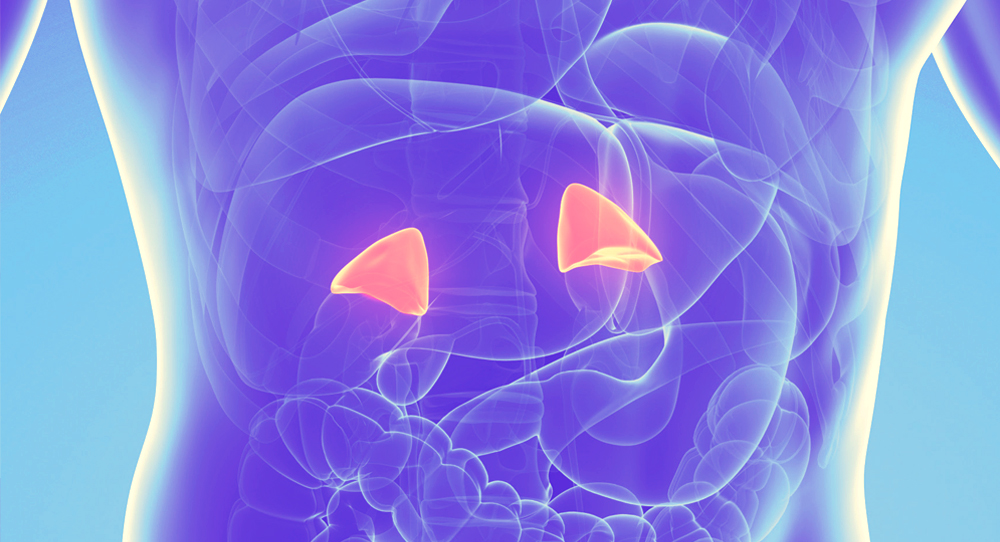Historically, the adrenal glands have worked to keep us alive during times of stress that include immediate dangers (e.g. attack by wild animals), and persistent stressors (e.g. long winters accompanied by limited food availability). Modern-day stressors are often very different, but are incredibly persistent. Pressures to perform, “stay connected”, lead perfect lives and “soldier on” despite fatigue and/or illness are leaving many physically and emotionally drained.
The Adrenal Glands Explained
The adrenal medulla responds in split seconds to acute stress with the release of adrenaline and noradrenaline, while the adrenal cortex responds in a somewhat slower manner, releasing a range of hormones whose goals are to maintain homeostasis during times of persistent stress.

Adrenal hormones released by the cortex include the glucocorticoids (GCs), mineralocorticoids (MCs) and androgens. One role of GCs is blood sugar maintenance. They stimulate glucose synthesis in the liver, often sacrificing muscle protein for substrates in order to preserve energy stores as body fat. Patients suffering chronic stress may thus experience hypoglycaemia if sufficient carbohydrates are not consumed regularly (due to suppressed gluconeogenesis). This type of patient should avoid very low carbohydrate diets, but instead aim to consume regular amounts of low GI carbohydrate foods.
If stress and thus GC elevations persist, a catabolic state may develop. This is characterised by difficulty maintaining muscle mass, often coupled with the development of stubborn abdominal fat.
As stress and GC elevations persevere, cortisol resistance, and subsequent immune dysfunction develops. Suppressions in the release of many essential immune factors such as sIgA - crucial in the defence against infection at mucosal sites - accompany this, and greatly increase the risk of opportunistic infections and immune-related disease.
GCs are released in response to not only psychological, but also physiological stress. When inflammation is present, their goal is immune suppression. As GC release and/or function declines, immune control becomes impaired. The result may be a persistent state of inflammation, autoimmune illness and/or heightened sensitivities to certain foods and other compounds in the environment.
The role of MCs is to maintain blood pressure though the reabsorption of sodium and thus water at the kidneys. As the body calls on greater GC release, MC availability is diminished, contributing to reductions in blood pressure (hypotension), dizziness on standing and dehydration.
Many sex hormones are synthesised from DHEA and other androgens produced by the adrenals. Where poor adrenal health is present, sexual function may be compromised (resulting in worsened PMS in women, lower libido in men etc.). Further to this, as many steroid hormones share common precursors for their manufacture, the requirement for higher amounts of GCs can compromise the availability of constituents essential to MC and androgen synthesis.
Chronic stress is also implicated in euthyroid sick syndrome, where thyroid dysfunction is present, despite the absence of clinical indicators (i.e. routine screening may suggest normal function, despite persistent symptoms of under-activity).
The reasons for this manifestation are many, but include changes in functioning of the deiodination enzymes which catalyse T4 to T3 and/or reverse T3 (rT3) conversion. High cortisol leads to alterations where peripheral synthesis of rT3 increases, and active T3 decreases. rT3 bears a similar structure to T3, allowing it bind with T3 receptors, despite an inability to exert T3 effects.
High cortisol also interferes with the hypothalamic-pituitary-thryoid (HPT) axis, disrupting normal feedback mechanisms, while adrenal fatigue and resultant immune dysfunction may (in combination with other factors) contribute to autoimmune thyroiditis.

Many neurotransmitters can be put out of balance as a result of the chronic stress that contributes to adrenal dysfunction. GABA function can be exhausted, monoamine metabolism is altered (reducing serotonin and melatonin availability), while growth factors in the brain responsible for the survival and regeneration of neurons (such as those in regions responsible for controlling mood, emotion and behaviour) are depleted. These factors, and others, all contribute to a reduced ability to cope with stress, possibly leading to panic attacks, sleep disturbance, anxiety disorder, and depression in susceptible individuals.
Treatment Considerations
The adaptogenic withinia has proven successful in reducing elevations in cortisol levels, and for improving specific parameters associated with stress management and wellbeing. Replenishing supporting nutrients that are commonly depleted due to chronic stress (e.g. vitamins B5, B6 and C, folate, phenylalanine and tyrosine) can be useful also.
Essential fatty acids are vital for their role in managing inflammation, mood, cortisol and nervous system health, making a high dose fish oil supplement a worthy inclusion.
Correcting dysbiosis which has likely developed is essential. Probiotics not only play a role in digestive health and reducing local inflammation, but also interact with the gut-brain axis, supporting a healthy response to stress, whilst boosting local secretory IgA synthesis, likely reduced during times of stress.
In addition to this, specific health concerns (associated with chronic stress) may call for additional therapy. This may include high dose magnesium to alleviate fatigue and difficulty relaxing, high dose vitamin C and astragalus with medicinal mushrooms for immune support; iodine, tyrosine, selenium, zinc, vitamin A and liver support for thyroid health; and bioavailable curcumin for additional anti-inflammatory support.
DISCLAIMER:
The information provided on FX Medicine is for educational and informational purposes only. The information provided on this site is not, nor is it intended to be, a substitute for professional advice or care. Please seek the advice of a qualified health care professional in the event something you have read here raises questions or concerns regarding your health.


